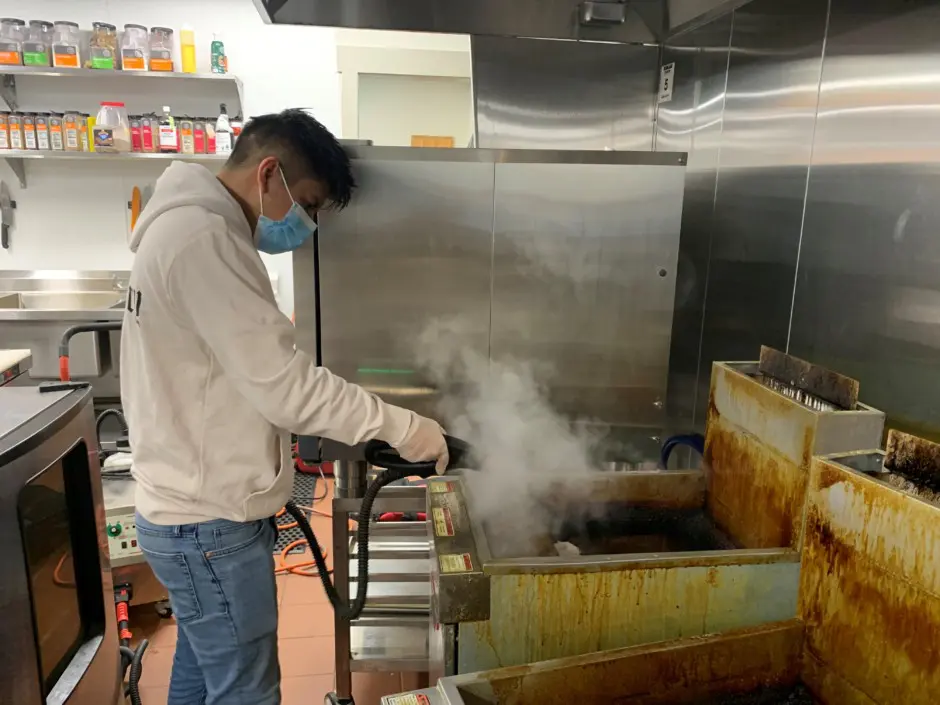When you have a restaurant, commercial kitchen or any type of food and beverage manufacturing facility, cleanliness must be your top priority to ensure the safety and health of your patrons. With food safety of utmost importance, it is vital to keep kitchen appliances, equipment, and surfaces clean.
What is best when cleaning a commercial kitchen?
A higher level of clean and safety is important for industries that manufacture or process consumable goods. This sector includes commercial kitchens, restaurants, a variety of food and beverage operations, as well as packaging applications that pack food or consumable items for transportation and distribution.
Facilities in the food and beverage industries have equipment and tools that regularly come into contact with grease, food residue, and oily by-products. This residue quickly builds up on equipment and creates health and safety hazards.
Typically, kitchens are cleaned by hand with manual scrubbing and by using harsh oven degreasers and disinfectant sprays. The residue from sprays and chemicals can spread across ovens, food prep areas, countertops, and even floors.

How do you sanitize a restaurant kitchen?
Vapor steam cleaning is becoming the gold standard of cleaning especially for commercial kitchens and food and beverage operations. Kitchen steam cleaning is a unique cleaning process that utilizes high-temperature, low-moisture water vapor and high-pressure application to clean, sanitize, and deodorize in one easy step.
Kitchen steam cleaning and sanitizing uses the power of high-temperature, low-moisture steam for cleaning commercial ovens, food processing equipment, and commercial kitchen appliances. A dry vapor steam is created by using only a small amount of water, heated to 240 degrees Fahrenheit, and is then applied with high-powered cleaning equipment. The steam cleaning process does not require the use of any chemicals or disinfectants in its process.

Kitchen steam cleaning is extremely effective at killing bacteria, molds, and microorganisms on contact. The high-temperature steam destroys grease, dirt, fats, and oils without using chemicals and the dry steam evaporates quickly, leaving minimal moisture behind.
- Steam cleaning eliminates the need for chemicals or disinfectants.
- Reduction in moisture levels.
- Effective at cleaning residual traces of grease, oil, dirt as well as bacteria and germs that cannot be seen by the naked eye.
- Environmentally friendly – low water usage and no harmful chemicals.
- Steam cleaning can be used for multiple types of equipment and products such as commercial kitchen appliances and equipment, floors, bathroom fixtures, windows, mirrors, and even furniture.
- Steam is quick drying making it great for kitchen surfaces that require less downtime.
Is Steam Cleaning Safe for Commercial Kitchen Equipment?
Unlike other cleaning methods and solutions that can fade colors, damage surfaces, and cause allergic reactions; vapor steaming surfaces is perfectly safe. You can use a steamer to clean and sanitize kitchen countertops, food prep areas, commercial ovens, coils and racks, deep fryers, range hoods, vents, appliances, cabinets, floors, and sinks. In addition, dry vapor steaming can be used to clean and sanitize bathroom countertops, floors, tubs/showers, and toilets.
Items and areas you should not use steam cleaning on include:
- Walls or furniture finished in water-based paint.
- Unsealed surfaces such as hardwood floors, marble, limestone, concrete, tile, or natural stone.
- Porous surfaces like cord, bamboo, paper, and cardboard.
- Flooring with cracks or gaps like parquet, which can be damaged from the high-pressure and heat.
- Deep-cleaning large areas of carpet.
- Delicate items, such as silks, thin plastics, and velour upholstery.
How Effective is Kitchen Steam Cleaning?
Using steam is one of the most efficient and effective cleaning techniques due to the low moisture, high-temperature steam. Steam cleaning is a preferred method for commercial kitchens and restaurants because it offers the following benefits:
- Kills 99.99% of bacteria and microorganisms.
- Removes stains, odors, grease, and germs.
- Steam can get into cracks, crevices, and hard to reach areas.
- Removes mold growth and prevents mold growth from recurring.
- Eliminates dust mites and keeps surfaces safe from crawling and flying insects.
- Clears away trapped allergens and pollutants.
- Does not damage equipment or surface materials.
- Chemical-free and reduced water usage makes it a great environmentally friendly option.
- Suitable for a variety of materials such as aluminum, stainless steel, plastic, polypropylene, and brass.
- Minimal downtime needed for cleaning.
Why Choose Steam Cleaning For Your Restaurant Kitchen and Oven?
Grease and other contaminants from cooking and food handling can be challenging to clean and removing it can become a massive task especially as it builds up over time. Dry vapor steam cleaning produces a superior and deeper level of sanitation for commercial kitchens and food industry facilities.
Dry steam dislodges soils and stains and sanitizes every surface by breaking down and removing residue, bacteria, and a host of other contaminants. Steam cleaning is effective at reaching into the nooks and crannies of your commercial kitchen oven where employees have trouble reaching.
The high temperatures used in the cleaning process not only clean efficiently but also kill germs and bacteria and leave your equipment shining and clean. This makes steaming ideal for cleaning companies like Commercial Cleaning Corporation.
Get your kitchen cleaned today, call for a quote!
Visit our Commercial Kitchen Cleaning Services page to see the services we offer. See all articles related to Restaurant Kitchen Cleaning.


91 thoughts on “Best Way to Clean a Commercial Restaurant Kitchen”
Comments are closed.